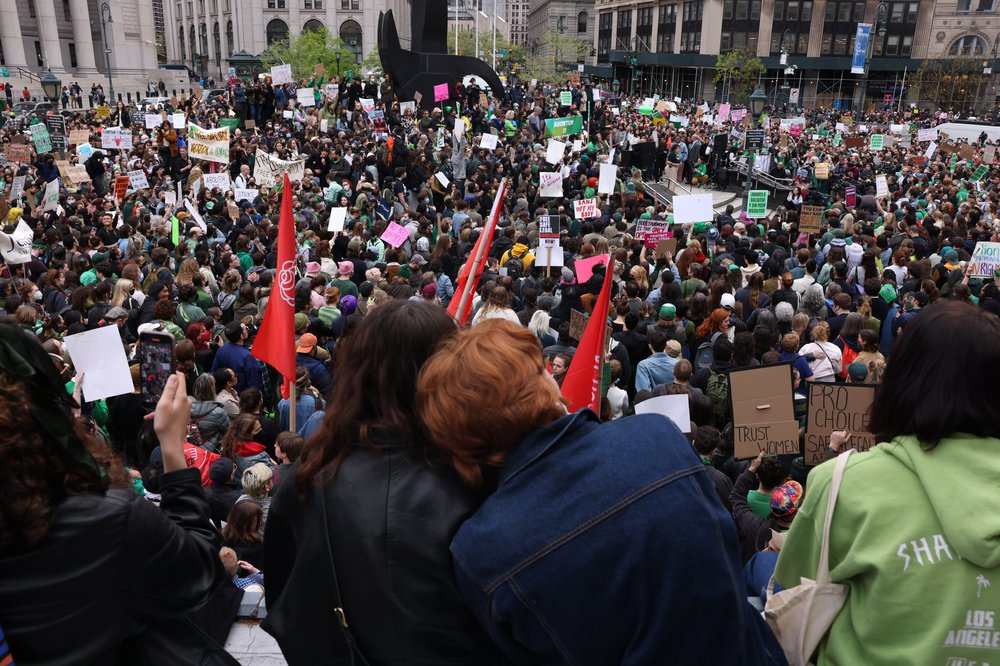‘Pre-Handmaid’s Tale’: New Yorkers reel in wake of Supreme Court's Roe reversal
June 24, 2022, 11:33 a.m.
State lawmakers have already taken steps to bolster abortion protections after the decision was leaked in May

Crowds gathered in Foley Square in May to protest a leaked draft opinion of the court, which was virtually identical to Friday's ruling.
For the second day in a row, New Yorkers were reeling in the wake of a Supreme Court decision handed down by the court’s conservative majority — this one upending decades of precedent assuring a woman’s right to a safe and legal abortion.
State Senate Majority Leader Andrea Stewart-Cousins reacted in real time on WNYC’s Brian Lehrer show, moments after the decision was published, calling the ruling, “a violation of women's rights to bodily autonomy.”
“Just imagine people being back in alleys again with people who are unqualified doing things … This is just unbelievable that we are in a version of a pre-Handmaid's Tale,” she said referring to the dystopian novel by Margaret Atwood. “This is a very, very sad day for the progress of our nation, and the progress of women.”
In their ruling, conservative justices overruled the 1973 decision Roe v. Wade, that established a person’s constitutional right to an abortion, as well as the 1992 decision Casey v. Planned Parenthood, which added another layer of protection by barring states from imposing an “undue burden” on someone seeking an abortion.
In the fallout of Friday’s decision, at least 26 states are poised to ban or further restrict access to safe and legal abortions, according to the Guttmarcher Institute, imperiling millions of women seeking the service across much of the United States.
“With sorrow — for this Court, but more, for the many millions of American women who have today lost a fundamental constitutional protection — we dissent,” liberal Justices Stephen Breyer, Sonia Sotomayor and Elena Kagan, wrote in a dissenting opinion.
Some New Yorkers who have dedicated their careers to providing abortions said while the ruling was expected after a virtually identical draft copy was published by Politico in early May, it was a devastating blow, just the same.
“How are you ever prepared for an illegitimate Supreme Court that rips away fundamental human and civil rights from half of this country’s population?” said Merle Hoffman, a women's rights activist and the founder of the Choices Women’s Medical Center in Queens. “How can you ever be ready for that?”
Abortion is still legal in New York and New Jersey. Abortion providers and political leaders in both states have been preparing for this moment, gearing up for a surge in patients from other states where the service will become impossible or difficult to obtain. Even before Friday’s decision, New York had seen a growing share of out-of-state patients — 8.9% in 2019, up from 3% in 2012, according to the federal Centers for Disease Control and Prevention.
BREAKING: The Supreme Court has taken away our right to abortion and overturned Roe v. Wade, opening the floodgates for states across the country to ban abortion.
— Planned Parenthood Action (@PPact) June 24, 2022
The court has failed us all — but this is far from over. ⤵
Moments after the opinion was released, people erupted in protest in front of the Supreme Court in Washington, D.C. And New York City is expected to see a wave of protests in the hours following the ruling, including ones planned for Union Square at 5 p.mand at Washington Square Park at 6:30 p.m.
New York and New Jersey reassured those seeking abortions that they would be welcomed with open arms.
“Our state will always be a safe harbor for those seeking access to abortion care,” Gov. Kathy Hochul said in a statement. “To anyone who is working to deny abortion access, our message is clear: not here, not now, not ever."
Across the river, Gov. Phil Murphy echoed those sentiments, tweeting, "In New Jersey, women will always have full autonomy over their own bodies and the right to make their own medical decisions."
New York lawmakers have already changed state laws to protect abortion providers here by barring the governor from carrying out extradition requests pertaining to abortions in other states; prohibiting law enforcement for arresting people performing abortions; and making it possible to sue someone who was interfering with reproductive rights guaranteed in New York.
Some lawmakers were pushing for an amendment to the state’s constitution to assure a right to an abortion, but that measure failed to pass. Separately, Gov. Kathy Hochul carved out $35 million to assist abortion providers to scale up operations and cover costs of unreimbursed care. Attorney General Tish James, one of the officials pushing to have the right to an abortion enshrined in the state’s constitution, said the ruling represented “one of the darkest moments in the history of this nation.”
“Two days in a row, politics came before people at the highest court in the land, and, as a result, the health of our nation now hangs in jeopardy,” New York City Mayor Eric Adams said in a statement. “What the court has done today ignores the opinions of the majority of Americans, as it helps states control women’s bodies, their choices, and their freedoms.”
Caroline Lewis contributed reporting.
As Supreme Court overturns Roe v. Wade, NY and NJ prepare safe havens for abortion NY abortion providers could see influx of out-of-state patients if Roe v. Wade is overturned